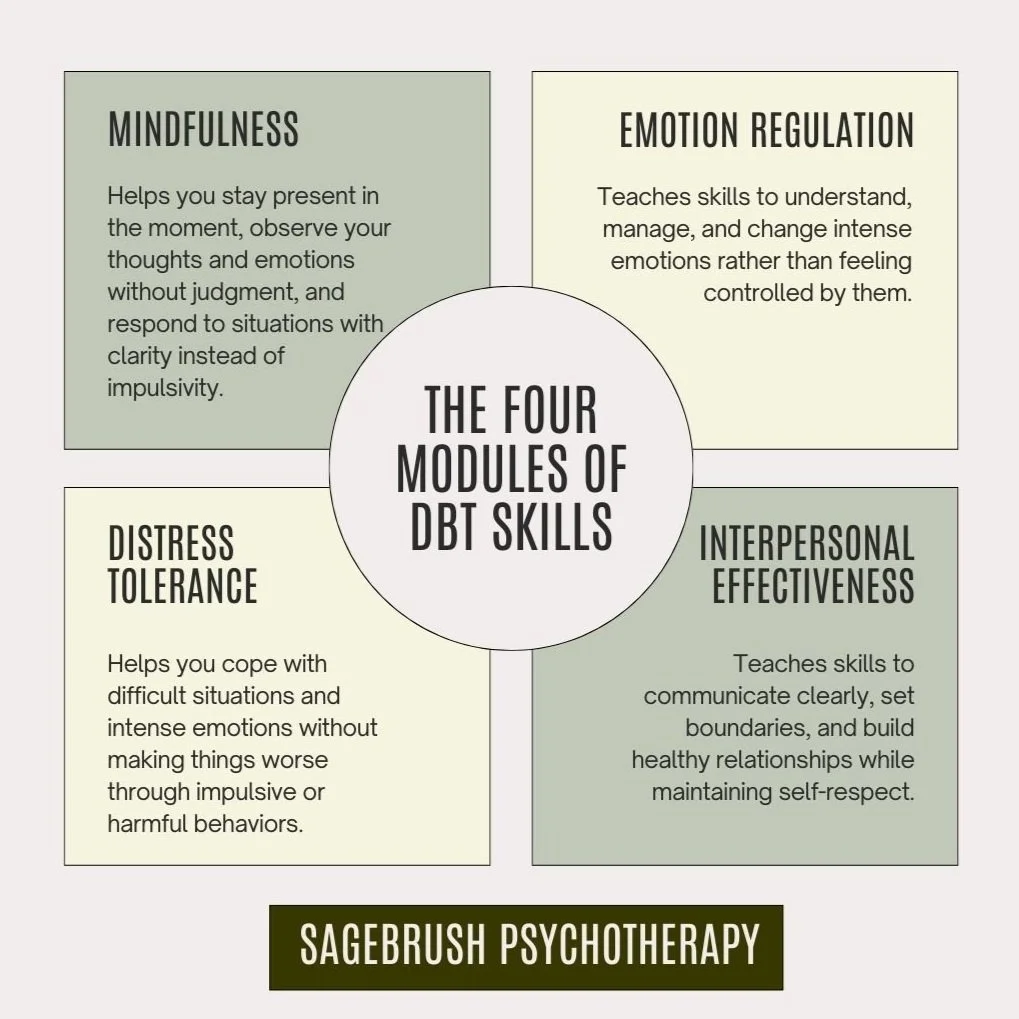DBT Therapy Los Angeles, CA
Our Dialectical Behavior Therapy Services in Los Angeles: DBT Skills Training
Do you ever feel like your emotions take over, leaving you overwhelmed, stressed, or reacting in ways you regret? Dialectical behavioral therapy (DBT) is a form of mental health treatment that can help you take back control by learning practical, research-backed strategies to manage emotions, handle stress, and improve relationships from DBT therapists. There are decades of research backing the effectiveness of DBT and the skills training. Joining a group skills training is shown to support the following disorders, but it not limited to these mental illness concerns:
Self harm
Bipolar disorder
Emotion dysregulation
Binge Eating Disorder
Bulimia
Our DBT Skills Offerings
DBT Skills Group For Adults
All Genders:
Mondays 6-7:30 pm online
Wednesdays 6:30-8 pm online
Women’s Group:
Wednesdays 5-6:30 pm online
One on One DBT Skills
Scheduled with your therapist
DBT Group for High Schoolers
Saturdays 1-2:30 pm in person in Silverlake
Finding connection in a Dialectical Behavior Therapy group
Group therapy is about is about more than learning new skills, it's also about thoughtful connection. One powerful part of a Dialectical Behavior Therapy skills group is that you won’t go through it alone. You’ll be with people who understand what you’re going through. You’ll be in a space where where you can share, learn, and grow alongside people who are working toward the same goal: building a life worth living.
As you begin using DBT skills you learn from DBT therapists in treatment in your daily life, you’ll start noticing meaningful changes.
What is Dialectical Behavior Therapy Treatment
Understanding DBT
Dialectical Behavior Therapy (DBT) is a type of Cognitive Behavioral treatment developed by Marsha Linehan. A comprehensive DBT program consists of weekly sessions with an individual therapist and weekly group skills training. When working with DBT therapists, individual therapy focuses on changing unhelpful behaviors and the DBT group focuses on increasing skills to manage life's stressors. Many people struggle with strong emotions and don’t know how to cope in a healthy way.
When this happens, they might engage in impulsive behaviors, like self-injury, substance use, or arguments. Dialectical Behavior Therapy teaches better ways to cope, so people don’t have to rely on these harmful behaviors.
Acceptance and Change: The core dialect
A dialectic is the idea that two seemingly opposite things can both be true at the same time. In Dialectical Behavior Therapy (DBT), this means balancing acceptance and change—accepting yourself and your emotions as they are, while also working to change behaviors that cause suffering.
For example, you can accept that you're feeling overwhelmed while also working on coping strategies to manage stress. You can validate your emotions while also recognizing that acting on them impulsively might not help. Individuals who struggle with mental health issues like Borderline Personality Disorder or anxiety often struggle with black-and-white thinking which is a rigid way of viewing the world where things are seen as either all good or all bad, a success or a failure, right or wrong, with no middle ground. This type of thinking can create intense emotional swings, unrealistic expectations, and difficulty handling life’s challenges. DBT therapists use dialectics to help people move away from black-and-white thinking (like “I’m either good or bad” or “I have to be perfect or I’m a failure”) and toward a more balanced and flexible perspective.
What a DBT Skills training session looks like
A DBT skills group is like a class that teaches practical tools to help people manage their emotions, handle stress, and improve their relationships. It is a core component of Dialectical Behavior Therapy, a Cognitive Behavioral Therapy (CBT) that integrates behavior therapy and acceptance strategies. Participating in a Dialectical Behavior Therapy skills group is a structured and supportive environment designed to help individuals develop concrete skills for managing emotions, improving relationships, and enhancing overall well-being. Here's what you can expect during a typical DBT group session:
1. Mindfulness Practice
Each session begins with a mindfulness exercise to help participants focus and center themselves. This could involve guided breathing, meditation, or an awareness activity to bring attention to the present moment. Mindfulness is a foundational skill in DBT, fostering emotional regulation and reducing reactivity.
2. Check Ins and Connection
Group members have an opportunity to share their progress, challenges, and successes in applying DBT skills. This fosters a sense of connection, validation, and mutual support. Participants are welcome to share at their comfort level.
3. Psychoeducation on the Skills of the Day
The heart of each session is focused on learning a specific DBT skill. These skills are drawn from core DBT modules discussed below.
The therapist or group leader explains the skill, provides examples, and facilitates discussions to ensure participants understand its practical application.
4. Homework Assignment
At the end of the session, participants receive a homework assignment to practice the skill learned that day in their daily lives. Homework helps bridge the gap between the group setting and real-world application, reinforcing growth and progress over time.
DBT skills groups are a collaborative and compassionate space where you can build emotional resilience, strengthen relationships, and gain tools to navigate life's challenges effectively.
Benefits of DBT
The benefits of Dialectical Behavior Therapy (DBT) are extensive and well-supported by research. By learning and practicing skills, people can see real, positive changes in their lives, such as:
Better control over emotions – Feel less overwhelmed and more in charge of how you react.
Healthier ways to handle stress – Learn tools to get through tough times without making things worse.
Stronger relationships – Communicate more clearly and build deeper, healthier connections with others.
Less harmful behaviors – Reduce impulsive actions like self-harm or substance use and improve overall mental well-being.
More self-understanding and self-acceptance – Learn to see yourself with more kindness and less judgment.
These changes help create a more balanced, confident, and fulfilling life.
The Four Modules of Dialectical Behavior Therapy Skills
1. Mindfulness
Increase self-awareness.
Reduce stress by focusing on the here and now.
Respond to situations with clarity rather than reacting impulsively. Mindfulness techniques include observing, describing, and participating in your experiences without judgment.
2. Emotion Regulation
Recognize and label emotions accurately.
Reduce emotional vulnerability by building a stable emotional baseline.
Develop healthier ways to respond to emotional triggers. With these skills, you can regain control over emotions and prevent them from overwhelming your daily life.
3. Distress Tolerance
Learning to tolerate intense emotions through self-soothing and distraction.
Accepting reality when it cannot be changed in the moment.
Developing resilience to handle challenging situations effectively. Distress Tolerance is especially useful during high-stress moments or emotional crises.
4. Interpersonal Effectiveness
Setting boundaries and saying "no" effectively.
Asking for what you need with confidence.
Maintaining self-respect while fostering positive relationships. Interpersonal Effectiveness teaches you how to navigate social situations with balance and assertiveness.
Finding a DBT Therapist in Los Angeles
If you're looking for a Los Angeles Dialectical Behavior therapist, there are many options available, whether you’re seeking individual therapy, a DBT skills group, or full-program DBT treatment. Since DBT is a structured, research-backed therapy, it's important to find a provider who is trained in DBT and follows its core principles.
What to Look for in a DBT Therapist
DBT Training & Experience – Make sure the therapist has specific training in Dialectical Behavior Therapy and experience working with emotional dysregulation, impulsive behaviors, or relationship struggles.
Offers Full DBT or Skills Training – Some therapists offer full DBT, including individual therapy and skills groups, while others focus only on skills training. Decide what level of support you need.
A Supportive, Non-Judgmental Approach – DBT therapists focus on validation, meaning they accept your experiences while also helping you make changes. Finding someone who creates a safe and understanding space is key.
Starting Dialectical Behavior Therapy in Los Angeles
If you’re looking to start Dialectical Behavior Therapy (DBT) in Los Angeles, Sagebrush Psychotherapy offers a supportive and research-based approach to help you navigate emotional challenges, impulsive behaviors, and relationship difficulties. Our practice specializes in compassionate, evidence-based DBT treatment, providing both individual therapy and DBT skills training to help you build the tools you need for lasting change. At Sagebrush Psychotherapy, we understand that struggling with intense emotions can feel isolating, which is why we focus on validation, practical coping skills, and meaningful personal growth. Whether you’re dealing with anxiety, depression, borderline personality traits, or difficulties managing stress, our DBT-trained therapists are here to support you every step of the way. Start your DBT journey with us and learn how to build a life that feels more stable, connected, and fulfilling.
Frequently Asked Questions
-
DBT (Dialectical Behavior Therapy) and EMDR (Eye Movement Desensitization and Reprocessing) are both highly effective, research-backed therapies, but they serve different purposes. DBT focuses on managing intense emotions, reducing impulsive behaviors, and improving relationships, while EMDR is designed to help people process and heal from traumatic experiences. The best approach depends on your needs—if emotional dysregulation, impulsivity, or relationship difficulties are major concerns, DBT may be the better fit. If you’re struggling with trauma or PTSD, EMDR could be more helpful. Many people benefit from both therapies at different stages of their healing process.
-
Yes, DBT and EMDR can be used together, but it depends on the individual and their therapist’s recommendation. Many therapists suggest starting with DBT to help stabilize emotions, build distress tolerance, and develop coping skills before processing trauma with EMDR. This foundation can make EMDR more effective and less overwhelming. However, some people successfully work on both therapies simultaneously if they have strong emotional regulation skills. Your therapist can help determine the best approach for your situation.
-
he cost of DBT therapy varies based on the therapist’s experience, location, and the type of service provided (individual therapy, skills group, or full DBT program). In Los Angeles, DBT therapy sessions typically range from $150 to $300 per session for individual therapy. DBT skills groups often running $75 to $125 per group session. Many therapists offer sliding-scale fees based on income, so it’s always worth asking about affordability options.
-
Yes! DBT is highly effective for adolescents, especially those who struggle with intense emotions, self-harm, suicidal thoughts, impulsivity, or relationship conflicts. For teens family members are often involved to help caregivers learn DBT skills alongside their teen. This support system helps teens apply DBT skills at home and in everyday life.
-
Coverage for DBT therapy depends on your insurance provider and plan. Some insurance companies cover individual DBT therapy if the provider is in-network, while others may reimburse out-of-network providers. DBT skills groups are sometimes covered but often considered group therapy rather than a medical necessity, making coverage less certain. If you’re unsure about coverage, contact your insurance provider and ask about benefits for individual therapy (CPT code 90837) and group therapy (CPT code 90853). Many therapists offer superbills for reimbursement if they are out-of-network.







